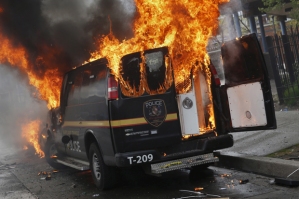The Eloquent Violence

As Baltimore burned this April, it was the clearest evidence yet that inner city America, where a good number of African-American youth live, is in the throes of a potent catharsis. The death of Freddie Gray trails only the headlines of the past few months, amongst which was the killing of 50-year-old Walter Scott by law enforcement. In many regards, the life and manner of death of Freddie Gray and the city in which he lived informs acts that otherwise will appear nonsensical, as mobs broke out into the streets looting and burning.
Admittedly, there was once upon a time in a not too distance past, where as I watched repeated images of a young black boy smashing a traffic cone into the driver’s side window of a parked sedan, I would have decried his stupidity, called him all unsavory names and questioned his aptitude. But not during these riots, I felt myself more engaged with the story behind the mindset of the boy.
Decorum and civility is the language of middle-class and upper-class citizens. Respectability and mobility demands properness. For these citizens who are socially and economically vested in the institutions around them, order is not only requisite, it is everything. So, one can imagine the agony and shock in the faces of these citizens, as they beheld mass mayhem break out in the streets and order being perverted. President Obama echoed a common conclusion: “Thugs,” he called them. But such characterization amplifies the failure of deeper thought in the elite class. It is a falsity that gives no count to the circumstances of our birth.
If Freddie had not died at the hands of the cops, it is hard to argue how the road ahead promised a robust and fulfilled life. Two Harvard professors recently solidified in numbers what has long been a common thought. In their report, Raj Chetty and Nathaniel Hendren crystalized how in America’s 100 largest counties, the most unfortunate places for a poor child to grow up are in those with an African-American majority, with the exception of three counties. And on this list, Baltimore City ranks dead worst.
According to court papers, Freddie’s mother is a heroin addict who could not read (and who knows what demons her own parents faced). He had a lengthy rap sheet that included convictions and a two-year stint in prison, and has also never held a real job. According to The Washington Post, he was four grades behind in reading. Still, he was a respectful and kind soul and popular among the people who knew him.
He lived in a neighborhood where there were no grocery stores and restaurants; not even a McDonalds. A neighborhood where residents are accustomed to daily interactions with the police. And as evidenced by his brutal death, it is a police force that no longer saw its duty in the traditional sense, but more so now as a force of animal control. And this is a point David Simon, co-creator of the “The Wire”, aptly narrates in his intense interview with The Marshall Project where he painfully discussed a police force that has lost its moral compass and no longer cared for good police work. In a twisted sense, police in these inner-city neighborhoods see itself as protector of a larger cultured society and residents as vermin that must be contained.
The sheer wretchedness of life in the Sandtown-Winchester neighborhood where Freddie lived has for decades deprived him and his co-residents the humanity a police force entrusted to serve and to protect should accord them.
Out of this inherited culture of disadvantage has manifested the violence we have witnessed, which is an echo of the sentiments of Frederick Douglas: Violence has no constitutional sanction; …But where grievances pile high and most of the elected spokesmen represent the Establishment, violence may be the only effective response … The use of violence as an instrument of persuasion is therefore inviting and seems to the discontented to be the only effective protest.
Obviously, at the root of the social disintegration of black life is economics. A point that was not lost on the Rev. Martin Luther King, Jr. which led him to start the Poor People’s Campaign before his untimely demise. But what has since happened, whatever the political policies of the times, is a glaring vacuum of national black leadership to demonstrably marshal the socioeconomic progress needed in these cities and neighborhoods. Instead, we are spectators to knee-jerk reactions by popular black figures who come alive for the cameras in times of perceived injustice and are soon retreated to the shadows in the aftermath.
Thusly, these youths live-out the horrors of desolation. Sad as it is, it is only because of these riots that the Justice Department has chosen to investigate the Baltimore City Police Department; which makes it just a bit harder to argue against the eloquence of the violence.

Leave a comment